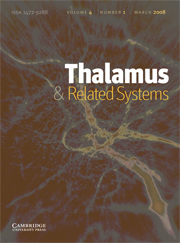Article contents
Formation of eye-specific retinogeniculate projections occurs prior to the innervation of the dorsal lateral geniculate nucleus by cholinergic fibers
Published online by Cambridge University Press: 19 January 2007
Abstract
We compared the developmental periods in the mouse when projections from the two eyes become segregated in the dorsal lateral geniculate nucleus with the time when this nucleus becomes innervated by cholinergic fibers from the brainstem. Changes in labeling patterns of different tracers injected into each eye revealed that segregation of retinogeniculate inputs commences at postnatal day five (P5) and is largely complete by P8. Immunocytochemical staining showed that cholinergic neurons are present in the parabrachial region of the brain stem on the day of birth. However, cholinergic fibers are not evident in the geniculate until P5, and these are sparse at this age, increasing in density to form well-defined clusters by P12. These results indicate that segregation of eye-specific projections during normal development is unlikely to be regulated by cholinergic inputs from the brainstem.
- Type
- Research Article
- Information
- Copyright
- © 2007 Cambridge University Press
- 5
- Cited by


